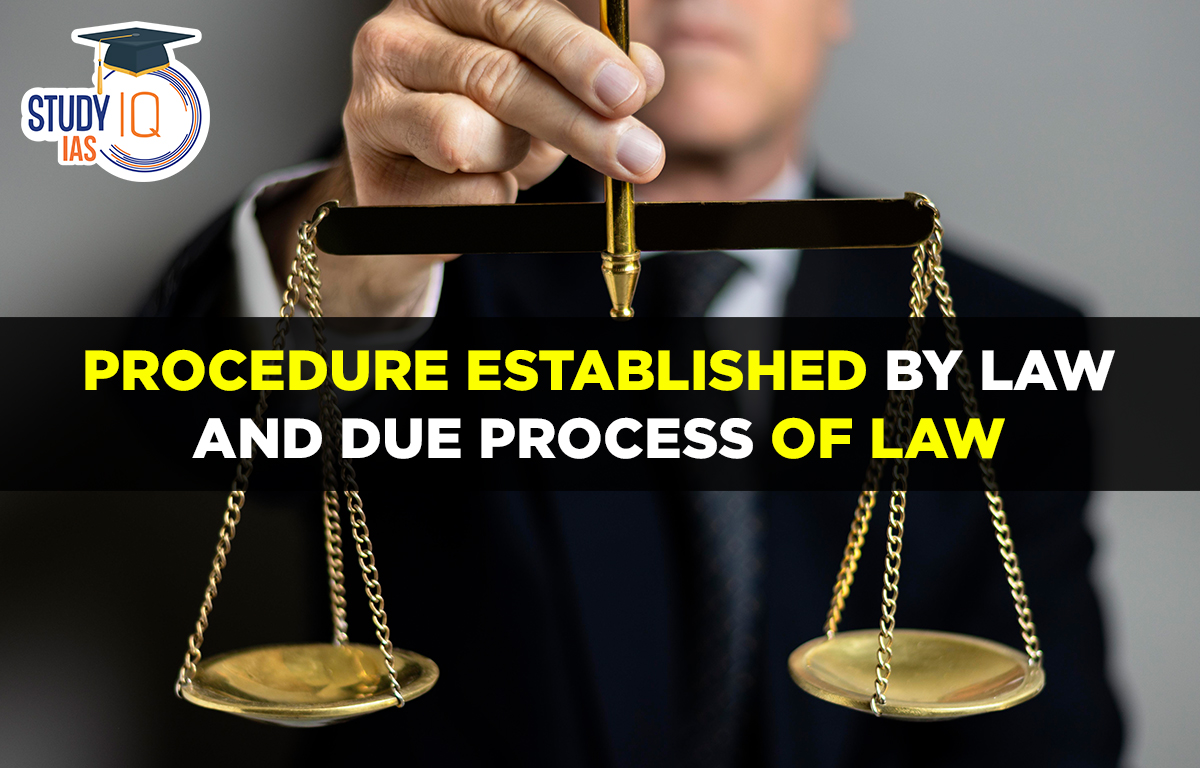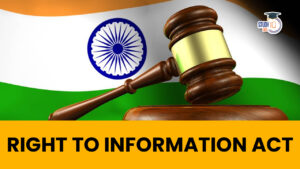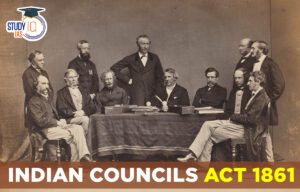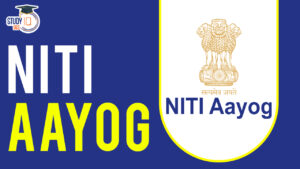Table of Contents
Procedure Established by Law and Due Process of Law
The phrase “Procedure Established by Law” appears in Article 21 of the Indian Constitution. It means that a law will be valid if it has been passed by the Parliament through the correct procedure. Implementing this idea implies that a person may be denied his or her life or personal freedom in accordance with the legal process. Following the Maneka Gandhi v. Union of India decision in 1978, the Indian judicial liberalised the definition of “procedure established by law” to make it comparable to the American idea of “due process of law” to protect a person’s Fundamental Rights.
The Privy Council referred to the legal process in King Emperor v. Benoari Lal Sharma (1944) as “the normal and well-established criminal procedure.”
Procedure Established by Law
The Supreme Court of India described the procedure created by law under Article 21 in the case of A.K. Gopalan v. the Government of India (1965) as simply adhering to the procedure specified in the statute and nothing more. As a result, if legislation has been passed in accordance with the procedure, a person’s “life” or “personal liberty” could be taken away. The phrase “parliamentary prescription” is highlighted in the language of Article 21 by the absence of the word “due,” the restriction implied by the word “process,” and the insertion of the word “established.”
In Maneka Gandhi vs Union of India (1978), the Supreme Court decided that in order for an established legal system to be recognised as a procedure at all and to satisfy the requirements of Article 21, it must be “fair, just, and reasonable, not whimsical, oppressive, or arbitrary.” The word “procedure established by law” now holds the same weight in the Indian Constitution as the phrase “due process of law” does in the Constitution of America.
Read More: Articles 12 and 13
Difference Between Procedure Established by Law & Due Process of Law
Even though a law violates fairness and equality standards, it is still valid if it was passed using the correct process, as specified by the law. Due to the method’s tight commitment, there may be an increased risk of endangering someone’s life and personal freedom. In an effort to limit such situations, the Supreme Court has underlined the value of the due process of law in a number of decisions.
Due Process of Law = Legal method + the procedure must be fair, just, and not arbitrary.
| Point of Difference | Procedure Established by Law | Due Process of Law |
| Meaning | It does not assess whether the laws made by the legislature or by the concerned authority are fair, just and not arbitrary. | It examines both the procedural and substantive aspects of legislation to evaluate its validity of the law. |
| Origin | Originated from the British Constitution. | Originated from the Constitution of the United States. |
| ConstitutionalProvision | It is under Article 21 of the Indian Constitution | The term is not explicitly mentioned in Article 21 of the Indian Constitution |
| Scope | Its scope is narrower. | Its scope is broader |
| Role | To determine whether the law made by the Legislature is made as per the procedure established by law or not. | It determines that the law is made is Just, fair and Reasonable and is not arbitrary and unjust by nature. |
| Power of judiciary | The judiciary has limited power to evaluate the procedure used by the legislature to enact the law in question. | The judiciary has the power to evaluate the procedure used by the legislature to enact the law in question. |
| Protection | It safeguards the rights of citizens from the arbitrary actions of executives. | It protects citizens’ rights from both executive and legislative actions |
| Impact of the doctrine | Strict adherence to the law increases the chance of having a detrimental effect on life and individual freedom. | Pay attention to all legal rights and respect everyone’s right to privacy. |
| The emphasis of the doctrine | This ideology places more emphasis on the legislature’s wisdom and the strength of the general public’s belief in the country. | The judiciary has a broad range of authority thanks to the due process of law. |
Read More: Right to Equality
Similarities Between Procedure Established by Law & Due Process of Law
Even though the doctrines of due process of law and procedure created by the law are applied in different ways, there are certain commonalities between them that are listed below:
- Both doctrines are fundamental elements in Indian democracy.
- In both cases, the Supreme Court is the highest court. The legitimacy of the legislation is decided by the Indian Supreme Court.
- The Indian Constitution has a specific reference to the legal process, making it legal in the nation. However, the subject of due process has come back to light in a number of recent Supreme Court rulings.
Read about: Article 14 of Indian Constitution
Procedure Established by Law and Due Process of Law Evolution in India
A.K. Gopalan v. Government of India (1965)
A political figure named AK Gopalan was detained in Madras as a result of the Preventive Detention Act of 1950. He asserted that the Prevention Detention Act’s actions violated his fundamental rights guaranteed by Articles 14, 19, and 21 of the Indian Constitution. He further asserted that Article 21’s reference to “procedure established by law” means following the law as it is intended. His situation involved an improper procedure that violated Article 21 of the Indian Constitution.
The Supreme Court found that the Indian Constitution’s Articles 14, 19, and 21 are not violated if the government revokes someone’s freedom in accordance with the legal process, i.e., if the imprisonment was carried out in line with the correct method. In this case, the Court applied a constrained interpretation of Article 21. In this instance, the Court interpreted Article 21 quite literally and determined that the phrase “process established by law” means that a procedure set forth in a statute may be used to revoke one’s right to life and personal liberty.
Justice Fazal Ali, however, dissented in this instance. According to him, the phrase “procedure established by law” also refers to the following: audi alteram partum (no person shall be left unheard). This is one of the fundamental principles of natural justice and states that no one should be denied the right to be heard.
Satwant Singh Sawhney v. D. Ramarathnam 1967
The court determined that the procedure established under Article 21 to deprive a person’s life and liberty has to be examined under Article 14 to check its validity and fairness. This decision initiated a new trend in the legal system of India.
R.C. Cooper v. Union of India 1970
It upheld the above judgement of the court in which the Supreme Court unequivocally said that the procedure followed under Article 21 must be reasonable.
Maneka Gandhi v. Union of India 1978
According to the Passports Act of 1967, authorities, in this case, held Maneka Gandhi’s passport. The petitioner claimed that the government’s seizure of her passport constituted a blatant violation of her personal liberty under Article 21 when she petitioned the Supreme Court under Article 32. By making our nation a welfare state, as stated in the Preamble, this choice significantly increased the scope of Article 21. The Court came to the conclusion that the legal process needed to be fair, just, and reasonable. The Court stated that a person’s right to life and personal liberty must be taken away in accordance with the law, and that process must be lawful, reasonable, and fair rather than arbitrary, capricious, and harsh.
Post Maneka Gandhi Judgment
The threefold test was created by the United States Supreme Court in Mathews v. Eldridge (1976) to determine whether or not legislation infringes individual freedom. A law must pass three requirements in order to be considered valid. Following Maneka Gandhi’s ruling, the Indian Supreme Court also accepted this standard. These are the three evaluations:
- If there is a law in place that empowers the state to take away someone’s life and freedom;
- Whether the Parliament has the authority to enact the relevant legislation;
- Whether the assembly followed the right steps when passing the law.
Read about: Article 15 of Indian Constitution
Procedure Established by Law and Due Process of Law UPSC
The scope of Article 21 of the Indian Constitution was very constrained prior to the Maneka Gandhi case. However, in the Maneka Gandhi case of 1978, the Supreme Court of India widened the scope of Article 21 by stating that the due process of law is one the basic and essential components of all legal processes. A person’s life and liberty cannot be taken away unless the following conditions are met.
- The law must be legitimate.
- There needs to be a correct process.
- That process ought to be impartial, just, and not arbitrary.
The legal process should not be regarded as a procedure at all if it is pointless, repressive, or unreasonable. To convey the concept of natural justice, a system must be reasonable or just. Natural justice aims to make the law more just.
Read More: Article 16 of Indian Constitution


 Right To Information Act, Objective, Fea...
Right To Information Act, Objective, Fea...
 Indian Councils Act 1861, History, Provi...
Indian Councils Act 1861, History, Provi...
 NITI Aayog Report on India’s Hand and ...
NITI Aayog Report on India’s Hand and ...





















